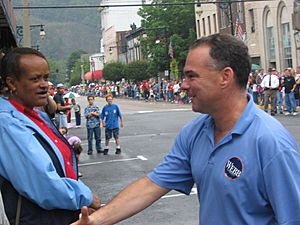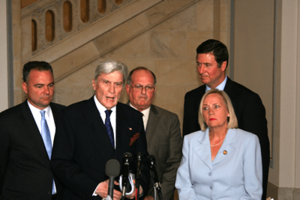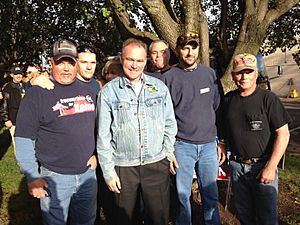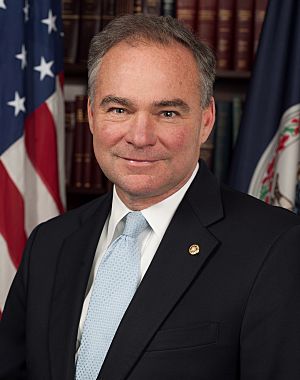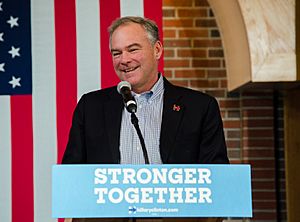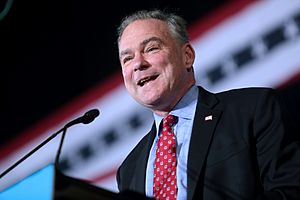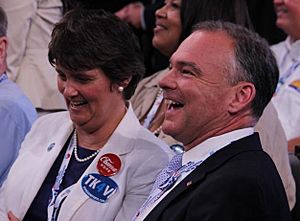Tim Kaine facts for kids
Quick facts for kids
Tim Kaine
|
|
|---|---|
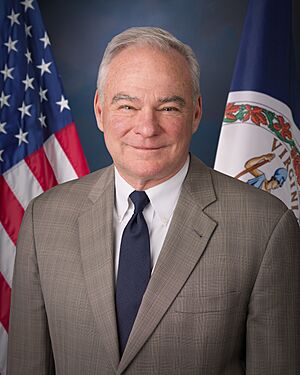
Official portrait, 2025
|
|
| United States Senator from Virginia |
|
| Assumed office January 3, 2013 Serving with Mark Warner
|
|
| Preceded by | Jim Webb |
| Chair of the Democratic National Committee | |
| In office January 21, 2009 – April 5, 2011 |
|
| Preceded by | Howard Dean |
| Succeeded by | Debbie Wasserman Schultz |
| 70th Governor of Virginia | |
| In office January 14, 2006 – January 16, 2010 |
|
| Lieutenant | Bill Bolling |
| Preceded by | Mark Warner |
| Succeeded by | Bob McDonnell |
| 38th Lieutenant Governor of Virginia | |
| In office January 12, 2002 – January 14, 2006 |
|
| Governor | Mark Warner |
| Preceded by | John H. Hager |
| Succeeded by | Bill Bolling |
| 76th Mayor of Richmond | |
| In office July 1, 1998 – September 10, 2001 |
|
| Preceded by | Larry Chavis |
| Succeeded by | Rudy McCollum |
| Member of the Richmond City Council from the 2nd district |
|
| In office July 1, 1994 – September 10, 2001 |
|
| Preceded by | Benjamin P.A. Warthen |
| Succeeded by | William J. Pantele |
| Personal details | |
| Born |
Timothy Michael Kaine
February 26, 1958 Saint Paul, Minnesota, U.S. |
| Political party | Democratic |
| Spouse | |
| Children | 3 |
| Education | |
| Signature |  |
| Website | |
Timothy Michael Kaine (born February 26, 1958) is an American lawyer and politician. He has served as a United States senator for Virginia since 2013. He is a member of the Democratic Party.
Before becoming a senator, Kaine was the 70th governor of Virginia from 2006 to 2010. He also served as the 38th lieutenant governor of Virginia from 2002 to 2006. In the 2016 election, he was the Democratic candidate for vice president of the United States. He ran alongside Hillary Clinton.
Kaine was born in Saint Paul, Minnesota, and grew up in Overland Park, Kansas. He studied at the University of Missouri and Harvard Law School. He then worked as a lawyer and taught law. His first public office was on the Richmond city council in 1994. He became mayor of Richmond in 1998.
After serving as mayor, he was elected lieutenant governor of Virginia in 2001. He then became governor in 2005. From 2009 to 2011, he led the Democratic National Committee. In 2012, Kaine was elected to the U.S. Senate. He won against former governor George Allen.
In 2016, Hillary Clinton chose Kaine as her vice-presidential running mate. They were nominated at the 2016 Democratic National Convention. The Clinton-Kaine team won the national popular vote. However, they lost the election to Donald Trump and Mike Pence in the Electoral College. Kaine was reelected to the Senate in 2018 and again in 2024.
Contents
- Early Life and Education
- Legal Career and Richmond City Council
- Mayor of Richmond (1998–2001)
- Lieutenant Governor of Virginia (2002–2006)
- Governor of Virginia (2006–2010)
- Democratic National Committee Chair (2009–2011)
- U.S. Senate (2013-present)
- Vice Presidential Candidacy
- Political Views
- Personal Life
- Awards and Honors
- Images for kids
- See also
Early Life and Education
Tim Kaine was born in Saint Paul, Minnesota. He is the oldest of three sons. His mother was a home economics teacher, and his father owned an iron-working shop. Kaine grew up in Overland Park, Kansas. He went to Rockhurst High School, a Jesuit school, where he was active in debate and student government.
He earned his degree in economics from the University of Missouri in 1979. After his first year at Harvard Law School, he took a break. For nine months, from 1980 to 1981, he worked with Jesuit missionaries in Honduras. He helped at a Catholic school and a vocational center. This experience helped him become fluent in Spanish.
Kaine graduated from Harvard Law School in 1983. He then moved to Richmond, Virginia, with his future wife, Anne Holton.
Legal Career and Richmond City Council
After law school, Kaine worked as a law clerk. He then joined law firms in Richmond. For 17 years, he focused on fair housing law. This meant he helped people who faced discrimination based on their race or disability. He also taught legal ethics at the University of Richmond School of Law.
Kaine became interested in politics through his wife's family. In 1994, he was elected to the Richmond city council. He served on the council until 2001. During his time on the council, he also served as mayor.
Mayor of Richmond (1998–2001)
On July 1, 1998, Kaine became mayor of Richmond. He was chosen by the city council. He was the first white mayor in Richmond in over ten years. Kaine took a very active role as mayor.
As mayor, he helped renovate and reopen the historic Maggie L. Walker High School. This school became a special magnet school for top students. Several other schools were also built during his term. Kaine supported "Project Exile," which moved gun crimes to federal court. This helped reduce the city's homicide rate by 55%.
Kaine often voted against tax increases. He also supported a program to reduce taxes for renovated buildings. This helped boost housing renovations in the city. Forbes magazine even named Richmond one of the "10 best cities in America to do business" during his time.
Kaine worked to bring people together in Richmond. He apologized for the city's past role in slavery. He also helped find a compromise during a debate about including a portrait of Robert E. Lee on city floodwalls. He believed it was important to show all of history, even the difficult parts.
Lieutenant Governor of Virginia (2002–2006)
Kaine ran for lieutenant governor of Virginia in 2001. He won the Democratic primary election. In the general election, he won against his Republican opponent, Jay Katzen.
Kaine was sworn in as lieutenant governor on January 12, 2002. His wife, Anne Holton, who was a state judge, swore him into office.
Governor of Virginia (2006–2010)
Election as Governor
In 2005, Kaine ran for governor of Virginia. He faced Republican candidate Jerry W. Kilgore. Kaine was not expected to win at first. However, he ended up winning with 51.7% of the votes.
Kaine focused on being responsible with money and solving traffic problems. He also benefited from being associated with the popular outgoing governor, Mark Warner. Kaine often spoke about the "Warner-Kaine administration."
The campaign became very negative near the end. Kilgore ran ads that were criticized as unfair. Kaine responded by explaining his views clearly. Voters seemed to believe Kaine and were upset by the negative ads.
Time as Governor
Kaine became governor on January 14, 2006. He was sworn in at the historic colonial Capitol in Williamsburg. He was the first governor since Thomas Jefferson to be inaugurated there.
In 2006, Kaine gave the Democratic response to President George W. Bush's State of the Union address. He talked about improving education and helping veterans. He also criticized the handling of the Iraq War.
Environment and Health
As governor, Kaine worked to protect over 400,000 acres (about 1,600 square kilometers) of Virginia land. He used special agreements to keep land from being developed. He also created a commission to study climate change.
In 2006, Kaine banned smoking in all government buildings and state-owned cars. In 2009, he signed a law banning smoking in most restaurants and bars. Virginia was the first Southern state to do this.
After the 2007 Virginia Tech shooting, Kaine set up a panel to investigate. Based on their ideas, he proposed investing $42 million in mental health programs. He also signed an order to help prevent gun sales to people with certain mental health issues. Kaine received praise for how he handled this tragedy.
Budget and Economy
One of Kaine's biggest challenges was the 2008 financial crisis. Virginia's unemployment rate stayed lower than the national average during this time. Kaine approved billions of dollars in budget cuts to keep the state running.
Virginia was ranked as one of the best states for business by Forbes magazine during his term.
Transportation
Kaine worked to improve transportation in Virginia. He supported plans to ease traffic congestion. He also pushed for more funding for highways, public transit, and road repairs.
Education
Under Kaine, more children in Virginia attended early childhood education programs. He expanded the Virginia Preschool Initiative. This program helps four-year-olds from lower-income families go to pre-kindergarten. Virginia was rated as the best state to raise a child in a 2007 report.
Democratic National Committee Chair (2009–2011)
In 2009, Tim Kaine was chosen to lead the Democratic National Committee (DNC). He took the job at President Obama's request. He served as DNC chair part-time while still being governor. His main goals were to protect Democratic seats in Congress and connect the president's campaign efforts with the party.
After his term as governor ended in 2010, Kaine taught part-time at the University of Richmond.
U.S. Senate (2013-present)
Senate Elections
In 2011, Kaine announced he would run for the U.S. Senate. He won the Democratic nomination without opposition. In the general election, he defeated former senator and governor George Allen.
Kaine was reelected to the Senate in 2018. He won against Republican Corey Stewart. In 2024, he was reelected for a third term, defeating Hung Cao.
Time in the Senate
Kaine was sworn into the Senate on January 3, 2013. He joined Mark Warner, who was the senior senator from Virginia.
In 2013, Kaine gave a speech on the Senate floor entirely in Spanish. This was the first time a senator had done this.
As a member of the Senate Committee on Foreign Relations, Kaine has focused on international issues. He supported the agreement with Iran about its nuclear program. He has also traveled to the Middle East to meet with leaders.
Kaine has continued to teach part-time at the University of Richmond while in the Senate. He is known for working well with both Democratic and Republican senators.
Kaine has often criticized Donald Trump's leadership style. He has said that Trump's actions challenge the U.S. Constitution.
In 2017, Kaine met with Pope Francis at the Vatican. He also discussed refugee issues and Latin American affairs.
Committee Work
Kaine serves on several important Senate committees:
- Committee on Armed Services: This committee deals with military matters.
- Committee on Foreign Relations: This committee handles international policy.
- Committee on Health, Education, Labor, and Pensions: This committee works on issues like healthcare and schools.
- Committee on the Budget: This committee focuses on government spending.
In 2014, Kaine helped create the bipartisan Senate Career and Technical Education Caucus. This group supports vocational education programs. He has worked to get more federal funding for these programs in high schools.
Vice Presidential Candidacy
2016 Campaign
Tim Kaine supported Hillary Clinton for president in 2016. He campaigned for her in many states. There was much talk that he might be chosen as her running mate.
On July 22, 2016, Clinton announced that Kaine would be her vice-presidential running mate. They appeared together at a rally in Miami, Florida. The 2016 Democratic National Convention officially nominated him on July 27.
Kaine was the first person from Virginia since Woodrow Wilson to be on a major party's presidential ticket. He was also the first Virginian to run for vice president on a major ticket since John Tyler in 1840.
Kaine released his tax returns and medical records to the public. He also co-authored a campaign book with Clinton called Stronger Together.
During the vice-presidential debate in October 2016, Kaine debated Mike Pence.
The Clinton-Kaine ticket won more popular votes nationwide. However, they lost the election in the Electoral College to the Trump-Pence ticket on November 8, 2016. This was the only election Kaine has ever lost. They did win Virginia, which was the only Southern state to vote for the Democratic ticket.
Political Views
Tim Kaine is considered a "mainstream Democrat." He generally votes with his party. He is known for his progressive views.
Healthcare
Kaine supports the Patient Protection and Affordable Care Act (Obamacare). He believes it helps many Americans get health insurance. In 2018, he proposed "Medicare X," a public health insurance option. This would be an alternative to private insurance plans.
He has also worked to lower the cost of prescription drugs. He signed letters asking drug companies to explain high prices.
Environment and Climate Change
Kaine believes in climate change. He has criticized those who deny it. He is concerned about sea level rise in Virginia.
He supports making coal energy cleaner. He also believes that protecting the environment helps the economy. Kaine supports developing solar energy and offshore wind turbines.
Gun Laws
Kaine owns firearms himself. However, he supports stronger gun laws. He wants expanded background checks for gun purchases. He also supports limits on the sale of certain combat-style weapons. He has received high ratings from gun violence prevention groups.
Immigration
Kaine supports programs like Deferred Action for Childhood Arrivals (DACA). These programs allow some undocumented immigrants to avoid deportation and work legally. He also supports overall immigration reform. This would allow people living in the U.S. illegally to gain legal status.
LGBTQ+ Rights
Kaine supports same-sex marriage. He has said that his personal views are different from his church's teachings on this topic. He believes the Roman Catholic Church will eventually change its view.
He also supports laws that prevent discrimination in employment based on sexual orientation.
Workers' Rights
Kaine generally supports labor unions. He has a high rating from the AFL–CIO. He also supports increasing the minimum wage.
Personal Life
In 1984, Tim Kaine married Anne Holton. She is the daughter of A. Linwood Holton Jr., a former governor of Virginia. Anne Holton has been a judge and served as Virginia's Secretary of Education. They have three children, one of whom is a U.S. Marine. The Kaines have attended St. Elizabeth Catholic Church in Richmond for many years.
Kaine enjoys playing the harmonica. He often carries several with him when he travels.
Because of his time in Honduras, Kaine is fluent in Spanish. During the 2016 campaign, he was the first person on a presidential ticket to give a speech in Spanish.
In May 2020, Kaine announced that he and his wife had tested positive for COVID-19 antibodies. In March 2022, it was reported that he has had long COVID symptoms.
In April 2024, Kaine published a book called Walk Ride Paddle: A Life Outside. The book describes his adventures hiking the Appalachian Trail in Virginia, biking the Blue Ridge Parkway, and kayaking the James River. He completed these long journeys over several years during weekends and Senate breaks.
Awards and Honors
Tim Kaine has received many awards for his public service. These include the Humanitarian Award, the Faith in Action Award, and the Award for Public Service in the Americas. He was also made a Knight Grand Cross of the Order of Isabella the Catholic in 2017.
Images for kids
See also
 In Spanish: Tim Kaine para niños
In Spanish: Tim Kaine para niños
 | Selma Burke |
 | Pauline Powell Burns |
 | Frederick J. Brown |
 | Robert Blackburn |




